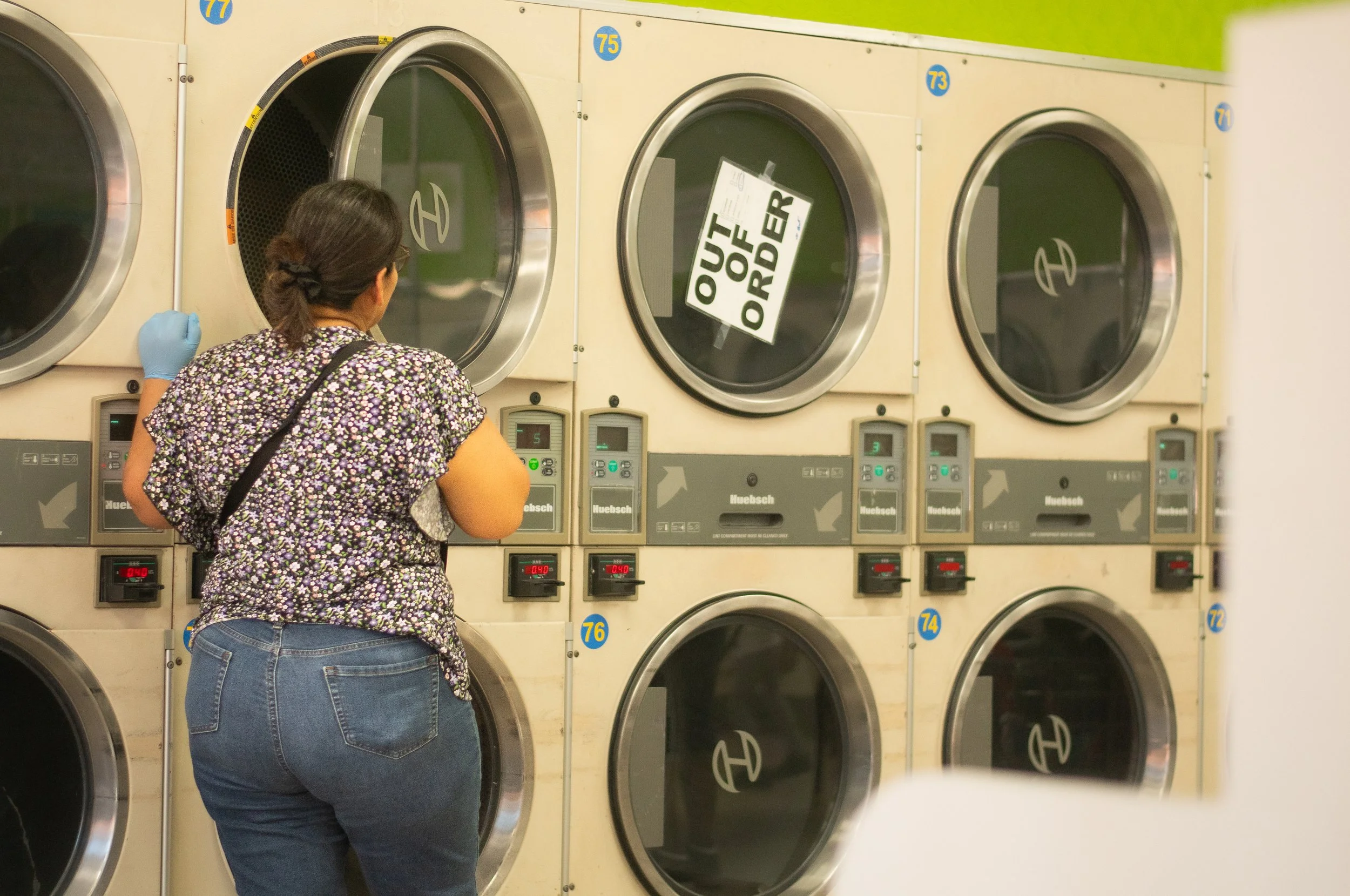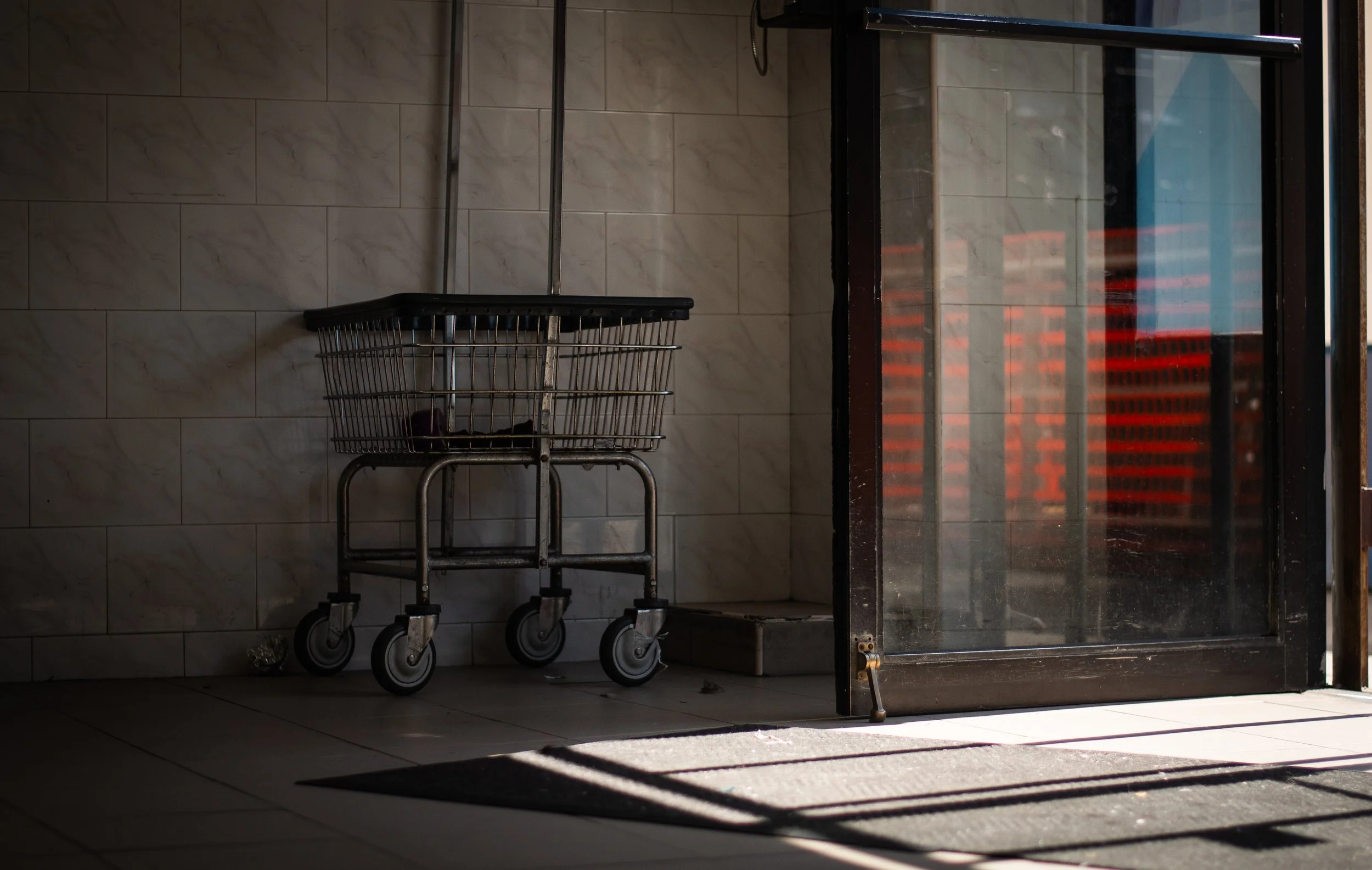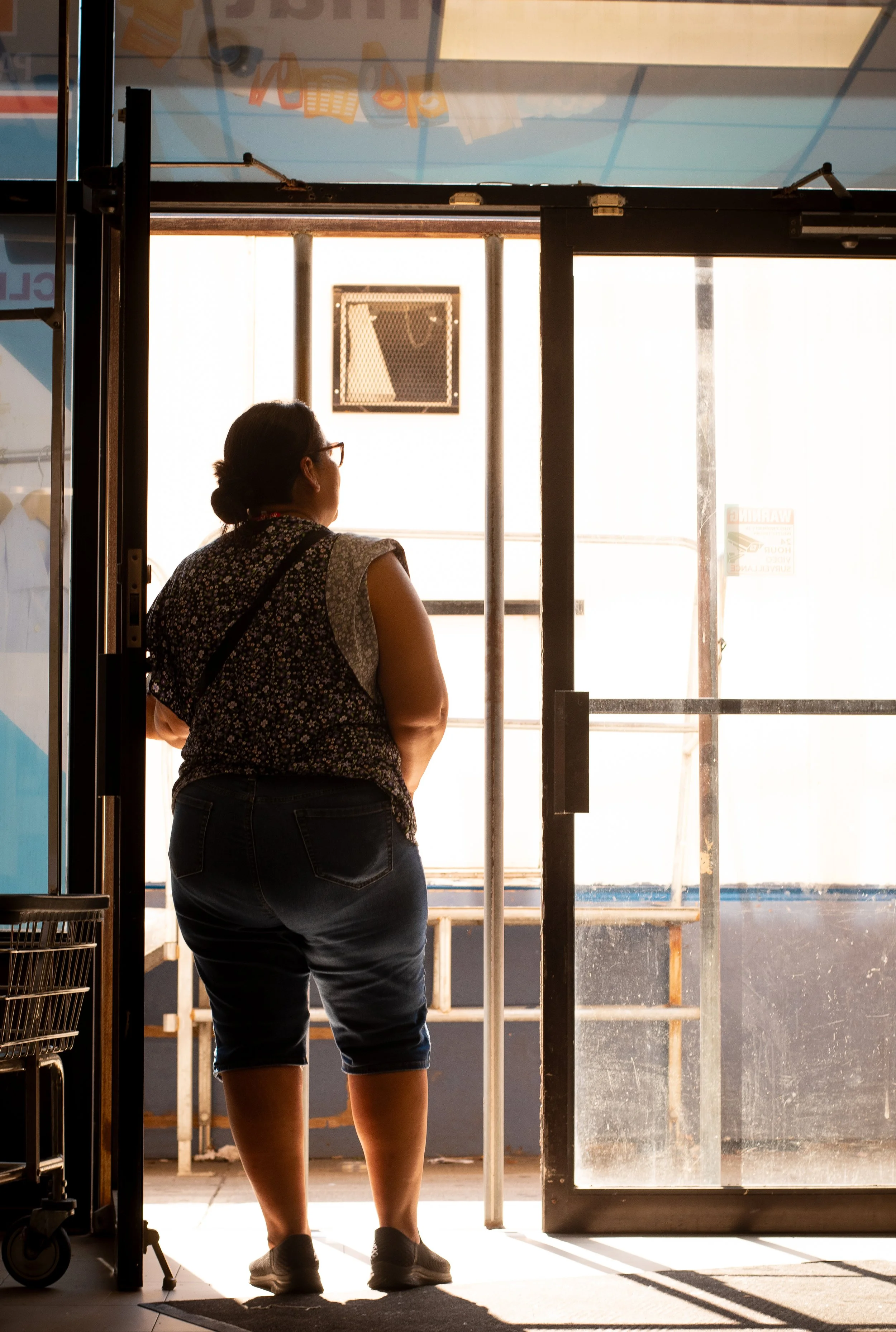The Women Who Keep New York Clean, and the System That Fails Them
Nearly invisible yet essential, women laundromat workers in New York City face abuse and exploitation — and are now leading a quiet revolution for their rights.
Wheeled carts are lined up in the back of a laundromat in Jamaica, NY, on July 9, 2025. / Kelly Kimball for More to Her Story.
When Beatriz Ramirez secured a job at one of the thousands of fluorescent-lit laundromats that dot New York City neighborhoods, her hourly pay was just over $6.50 per hour, half of the legal minimum wage at the time. But Ramirez enjoyed the work.
“I can work in a hotel, in the kitchen, or in a restaurant. But I love the laundromat more,” she said over the phone in Spanish. “It’s hard work, but it’s good work.”
The client interactions — even building new friendships — and learning the technical aspects of the various machines, were some of her favorite parts. The work was also consistent. It helped to support her family, who she talked about with pride.
“We are very close-knit,” she said of her husband and five daughters, the youngest of whom is studying performing arts in high school.
Ramirez isn’t alone. Like many women in New York’s laundry industry, she worked grueling hours for low pay, often without legal protections or basic rights. A 2018 study by the Laundry Workers Center and Cornell University’s Worker Institute found that 86 percent of laundromat workers in the city are women, most of them immigrants. These women shoulder New York’s hidden, physical labor, often supporting families while keeping other households running.
And New Yorkers depend on them. With some of the smallest apartments in the country and aging buildings that often can’t accommodate in-unit washers and dryers, doing laundry at home isn’t an option for most. In fact, only about 34 percent of apartments listed on StreetEasy had in-unit laundry, according to data shared with Gothamist. That number doesn’t even reflect the older housing stock where many longtime New Yorkers live. In these homes, clean clothes come not from machines in a hallway, but from the hands of women like Ramirez.
It’s no wonder, then, that laundromats were considered essential services in New York State during the COVID-19 pandemic. Many shops offer the option to pick up clothes, wash, dry, fold them, and deliver them back to customers’ homes — most within 24 hours. But what seems like an extreme convenience comes at a cost.
“We are not protected”
In 2020, at New Giant Laundry Center in New York City’s Queens borough, Ramirez loaded machines, folded clothing, and packed up hundreds of pounds of laundry nearly everyday. Since starting the job in 2018, she regularly worked 12-hour shifts with no breaks, often amounting to over 55 hours of work per week. But that overtime wage was glaringly missing from her paychecks. When the pandemic hit, Ramirez said her employers refused to provide protective equipment to keep her and others safe from COVID-19, insisting instead that Ramirez provide her own protective equipment.
“I was working, working, without protection, without anything,” she said.
Beatriz Ramirez in a laundromat in Jamaica, NY, on July 9, 2025. / Kelly Kimball for More to Her Story
After contracting the virus, she said she asked to leave work to go to the doctor but her bosses refused. When she called her husband to pick her up, her employers fired her. It was a breaking point for Ramirez. She decided to take New Giant Laundry Center’s owners to court.
“Win or lose, I have to do it,” she said. “I did it for all those people who don't want to do it, who are afraid of the boss. It’s demonstrating that we also have the right to speak.”
The seed for Ramirez’s decision was planted earlier, however. A member of the Laundry Workers Center, an advocacy organization helping low-wage workers in New York City and New Jersey, had visited her laundromat to share information about minimum wage, mandatory break time, and general workers’ rights.
“It's like an adrenaline rush,” said Ramirez about the moment she learned about her rights. “It filled me with courage, because I began to read the information, the rights that I had as a worker. Like how much the minimum wage was, that they didn’t pay me. That I had lunch hours that they didn’t give me.”
Ramirez’ story is one of many. The laundry sector remains rife with worker complaints, said Rosanna Rodríguez, the co-executive director of the Laundry Workers Center.
An “out of order” sign hangs on a machine at a laundromat in Jamaica, NY, on July 9, 2025. / Kelly Kimball for More to Her Story
Most of the workers impacted are women, Rodríguez noted, “and most of them are the head of the household.” These women are sometimes forced to endure unfair pay or other abuses to keep their families afloat. A 2024 survey by the Laundry Workers Center showed that of the 1,300 laundromat workers who responded, three-quarters were women. More than half self-identified as Latino, and more than one third as Asian. Immigrants are overrepresented in the laundry industry across the country. This leaves some with fewer options for employment, and puts them at a higher risk for facing exploitation in the workplace.
Just over 15 percent of respondents to the 2024 survey stated that they do not get paid the minimum wage, and 71.2 percent stated they are not paid for overtime hours.
"I don't get paid by the hour; I only get a salary of $200 a week for 40 hours," said one of the survey respondents. Another reported, “I feel bad because I have not been given any kind of raise, and my salary has not been adequate, at any time … I have been working for 26 years in the same place.”
Another worker who More to Her Story spoke to, Gabriela*, folded laundry throughout the entire interview. She said she was previously working at least 12 hours per day, 6 days a week, and being paid $380 per week. This went on for about five years. Gabriela noted that, a few years ago, a new owner took over the shop and started paying workers minimum wage. The change in ownership also meant that the number of working hours went down. There was never, however, any discussion of workers receiving back-pay for all of the years when they hadn’t been paid properly.
For Maria*, who is also employed at a New York City laundromat, health risks stand out as some of her biggest concerns.
“I am dealing with chemical exposure and inhalation,” she said. (Laundry workers can be at risk of respiratory irritation from breathing fumes from chemicals such as chlorine, hypochlorite, ammonia and sulphur dioxide.) “I have to bring all of my own equipment, masks, water, everything ... I have to have more resources to protect my health. We’ve even had machines catch on fire. We are not protected.”
An earlier report from the Laundry Workers Center found that “laundromat workers face significant health and safety issues” with nearly all respondents reporting exposure to at least one potential workplace hazard including bleach, other chemicals or excessively soiled clothing. The 2024 survey by the center showed that nearly half of respondents have never used a paid sick day.
Heightened fears
Rodríguez and her colleagues at the Laundry Workers Center have always been cautious about how they approach vulnerable workers. But now, with New York City Mayor Eric Adams having shown support for Trump’s immigration crackdown, tensions are high — particularly among Latino workers.
The entrance to a laundromat in Jamaica, NY, on July 9, 2025. / Kelly Kimball for More to Her Story
“ There's a lot of fear in the community,” said Rodríguez. “It's hard to organize. People need to really be committed to take action.”
The Trump administration began the year with Immigration and Customs Enforcement (ICE) raids in major cities, including New York, in what The Wall Street Journal and others have described as a “shock-and-awe” tactic that has left immigrant communities rattled. According to estimates from the investigative outlet City Limits, approximately 340 individuals were arrested by ICE in New York State during the administration’s first 100 days. Patricia Campos-Medina, the executive director of Cornell University’s Worker Institute who also previously spent 10 years organizing industrial laundries, also believes workers are hesitant to raise their voices under the current administration.
“I think [laundromat] workers are going to be more careful about fighting back for fear of being reported, and that's going to quell worker complaints on violations of [Occupational Safety and Health Administration] OSHA and health and safety…. The Biden administration had put a lot of money into supporting these groups…that money has disappeared,” noted Campos-Medina.
The Trump Administration ordered widespread layoffs at the National Institute for Occupational Safety and Health on April 1. AFL-CIO, the largest federation of labor unions in the United States, and several other labor unions filed a lawsuit in response in May. AFL-CIO President Liz Shuler stated that “an injury to one is an injury to all” in response to executive orders on the “rolling back of immigrants’ rights.”
An additional challenge is that workers at retail laundromats are often isolated: They may work shifts by themselves or with only a few other colleagues. Language gaps between co-workers can affect the transfer of information about legal protections.
“In doing research, we found out [the laundromat] industry was not represented; no one was thinking about this sector,” Rodríguez said about part of the inspiration for building the Laundry Workers Center. Campos-Medina has also observed those same difficulties. She explained that there are many laundromats with a small number of workers, making it different to organize at scale. “So the approach has to be different, and not many formal unions wanted to represent that industry.”
Progress among industrial laundries
While workers at retail laundromats struggle to be heard, workers at industrial laundry businesses are making an impact. These laundries operate on a different scale, where as many as 500 workers clean table linens for restaurants, bedding for hospitals and nursing homes, and uniforms for a range of professions. The sheer size of these laundromats make it easier and more impactful for worker’s unions to represent them.
Labor organizers have seen some wins for workers of these industrial operations. In 2022, following legal battles by workers and advocates, New York Attorney General Letitia James recovered $90,000 in stolen wage theft at an industrial laundry operation in Queens. And in 2024, the New Jersey department of labor secured more than $200,000 in fines and back pay wages against a commercial laundry in Passaic County.
More recently, in April, the New York City Council passed a non-binding resolution that calls for hospitals to only have contracts with laundry companies that uphold labor, safety and wage laws. The move came after years of workers claiming sweatshop-like conditions at industrial laundry facility FDR Services Corp and a 2021 settlement resulting in ten workers being awarded $400,000 in damages total after being unlawfully fired.
For Megan Chambers, co-manager of the Laundry, Distribution and Food Service Joint Board, with the labor union Workers United, the fight against FDR Services Corp is far from over.
“Our message to [laundry facilities like FDR Services Corp] is we're not going to forget this. You have to fix this until our members have fair contracts with union health insurance and pay and protections like others in this industry,” said Chambers. “We are not going away.”
Meanwhile, some legislative efforts to support workers in laundry and other industries have sputtered — like the New York state SWEAT Act, which would help protect workers from wage theft. That bill has been stuck in senate committee limbo since 2023.
But a couple of recent state laws offer hope. In 2023, New York Governor Kathy Hochul signed two bills, one that expanded which workers can access wage payment protections, and another that elevates wage theft to a crime of larceny.
“Unity is strength.”
While the laundry industry tends to attract immigrant workers, it also attracts the immigrant entrepreneurs who own and run many of New York City and surrounding area’s mom and pop laundromats.
Many of those business owners are Asian, with a significant number of Chinese owners — a community that turned to running laundry operations while being blocked from other jobs due to discrimination during the Chinese Exclusion Act era which continued until the mid 1900s.
Beatriz Ramirez stands at the entrance to a laundromat in Jamaica, NY, on July 9, 2025. / Kelly Kimball for More to Her Story
Today, owning and running a laundromat is, on average, a profitable business, said Brian Wallace, president and CEO of CLA, The Laundry Association — a group that advocates for laundromat owners and the industry as a whole. The small business owners see an average 20-25 percent profit after the initial investment is paid off, said Wallace in a phone interview.
When asked what CLA is doing to combat wage theft in the industry, Wallace said he didn’t “agree with the premise” that mom-and-pop operations are regularly violating labor laws.
But in 2023, neighboring New Jersey’s wage and hour division partnered directly with his organization to educate laundromat owners on workers rights. The move came after state investigators visited 20 retail laundromats finding that workers were owed $56,000 in stolen wages, and that many workers had not received their earned sick leave. Investigators discovered wage and hour violations at all but one of the retail laundry locations.
Wallace added that members of the CLA want fair competition. “If they’re running their business in a professional manner and they have a competitor who's paying under the table or otherwise, skirting the statutory requirements, that's simply not a fair playing field.”
Whether or not laundromat owners truly want that equitable environment, Rosanna Rodríguez of the Laundry Workers Center said wage and rights violations continue.
For Ramirez, standing up to those violations was worth it. Her lawsuit against New Giant Laundromat led to a settlement that secured her back pay and her job reinstatement. Now she has returned to the very place where she first faced injustice.
Meanwhile, Ramirez has become a powerful voice within the Laundry Workers Center. Traveling across the city’s laundromats, she shares vital information, listens to women’s stories, and inspires other mothers and breadwinners to find their own courage and speak out.
On working with others to secure rights for women like herself, she says, “Que la unión hace la fuerza. Ah, y si se puede!” — “Unity is strength. And yes, it’s possible.”
*Names have been changed to protect the identity of sources.
July 18, 2025, 2:51 PM ET Correction: A correction was made to properly reflect when the Laundry Workers Center visited Ramirez's laundromat.






